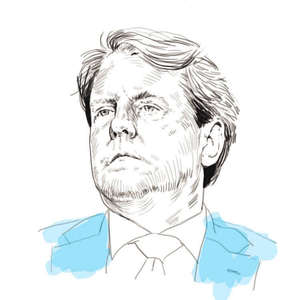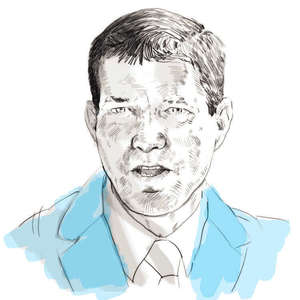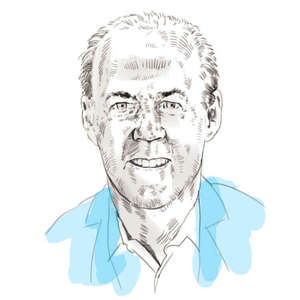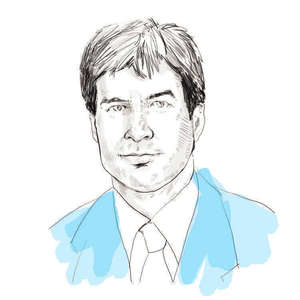
From the confirmation of Associate Justice Amy Coney Barrett ’97J.D. to the U.S. Supreme Court to the 2020 election, its aftermath and the Biden administration transition, Notre Dame graduates played a prominent role this past fall on the American political landscape. . . . Former White House counsel Donald McGahn ’91 had made headlines during the Robert Mueller investigation into President Donald Trump’s 2016 campaign, earning praise from across the political aisle for refusing to fire the special prosecutor at the president’s direction. McGahn also made his influence felt by leading the administration’s selections of federal judicial nominees. He left the White House two years before Barrett’s nomination and did not attend the Rose Garden ceremony introducing her to the country, but his recommendation prompted her path to the federal bench in 2017 and ultimately played a role in elevating her to the nation’s highest court. . . .
That Rose Garden ceremony became the subject of much scrutiny after more than a dozen people in attendance, including University President Rev. John Jenkins, CSC, ’76, ’78M.A., and Trump himself, tested positive for COVID-19. Given the historic nature of the event to the Notre Dame Law School, several administrators and faculty members attended, along with graduates who have important roles in the Trump administration. Among the guests were Stephanie Maloney ’14J.D., Justice Department chief of staff and counsel; Kate O’Scannlain ’99, ’05J.D., the top lawyer in the Labor Department; and Theodore Wold ’11J.D., special assistant to the president for domestic policy. None of the three is known to have contracted COVID-19. . . .

For a few tense days in October, the president’s physician, Sean Conley ’02, provided Americans with regular updates on Trump’s health. Once the president tested positive, he spent three days at Walter Reed Medical Center. Conley, a doctor of osteopathic medicine, had been a U.S. Navy emergency physician and head of trauma for a NATO unit that received Romanian medals of honor for saving the life of a soldier from that country who suffered grave injuries in Afghanistan. At a podium outside Walter Reed, wearing a white lab coat emblazoned with the presidential seal, Conley became the face of Trump’s illness and recovery. . . . Former Texas congressman John Ratcliffe ’86 became director of national intelligence in May. On a couple of occasions this fall, he was criticized within the intelligence community and on Capitol Hill for politicizing investigations into alleged foreign election interference. . . . For roughly a decade Richard Pilger ’87, a career prosecutor in the U.S. Department of Justice’s Public Integrity Section, oversaw election fraud investigations. In a November 9 email to colleagues, he “regretfully” resigned his position as director of the DOJ’s Election Crimes Branch after Attorney General William Barr authorized federal prosecutors to investigate “specific allegations” of fraud in the presidential election before the results became official. The New York Times reported that Barr’s move upended department policies that restrict such inquiries until “voting results have been certified to keep their existence from spilling into public view and influencing either voters or local election officials who ensure the integrity of the results.” . . . Matt Schlapp ’90, chairman of the American Conservative Union, made allegations of election fraud in Nevada. Schlapp appeared at a press conference in the state on November 8 and told Fox News there were “literally 9,000 people who voted in this election who don’t live in Nevada.” The claims were never substantiated. By November 30, Nevada Republicans had dropped lawsuits in federal and state courts asserting fraud and irregularities with voter verification machines in the state. . . . Federal judge Matthew Brann ’87 dismissed the Trump campaign’s lawsuit in Pennsylvania alleging significant improprieties with mail-in ballots. Brann, a former Republican Party official in the state and a Federalist Society member appointed to the bench by President Barack Obama, said in his November 21 decision that Trump’s attorneys offered only “strained legal arguments without merit and speculative accusations . . . unsupported by the evidence.” . . .

Brian McKeon ’85 has had a long career in government as a foreign policy and national security adviser, much of it on Joe Biden’s staff. From 1988 to ’95 he served as the then-Delaware senator’s legislative assistant for foreign policy and defense, later becoming Vice President Biden’s deputy national security adviser. Until recently the senior director of the Penn Biden Center for Diplomacy & Global Engagement at the University of Pennsylvania, McKeon was an adviser to the president-elect’s campaign, telling The Citizen in his hometown of Auburn, New York, that he felt “elation and relief” when Biden was declared the winner. . . . During his victory speech on November 7, which bumped part of the Notre Dame-Clemson game off NBC, Biden offered those Fighting Irish fans who didn’t flip over to the continued game coverage on USA Network at least one University-related highlight. The second Catholic elected president referred to the hymn “On Eagle’s Wings,” written in 1976 by Father Michael Joncas ’78M.A., now an artist in residence at the University of Saint Thomas in St. Paul, Minnesota. Biden concluded his remarks by quoting lyrics from the song, which he said “captures the faith that sustains me and which I believe sustains America.” . . .

Robert Rodriguez ’85, a professor of emergency medicine at the University of California San Francisco, was one of 13 health experts named to President-elect Biden’s COVID-19 task force in November. Rodriguez has been an emergency room physician for 25 years. In July he spent what he called the hardest week of his career treating COVID-19 patients in his native Brownsville, Texas, a border town that had been especially hard hit. At the time, Cameron County, Texas, with half the population of San Francisco, had five times as many deaths from COVID-19 as did California’s fourth-largest city. Rodriguez attributes the disparity to socioeconomic status, such as housing situations that put many people in close proximity. The doctor also has studied the toll that stress and anxiety have taken on health care professionals during the pandemic. . . . What meetings and events will Vice President-elect Kamala Harris be attending and when? Ryan Montoya ’96 will be keeping track of that as the veep’s chief scheduler. The former Obama White House adviser and chief technology officer for the NBA’s Sacramento Kings signed on to Harris’ team as scheduling and advance director after she joined the Democratic ticket in August.